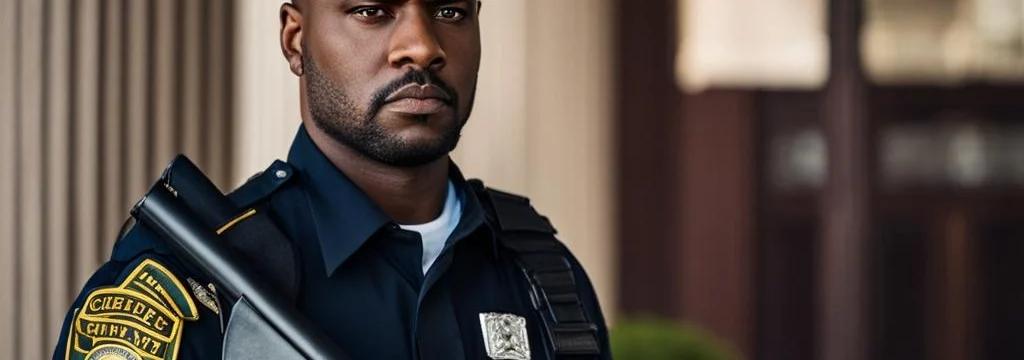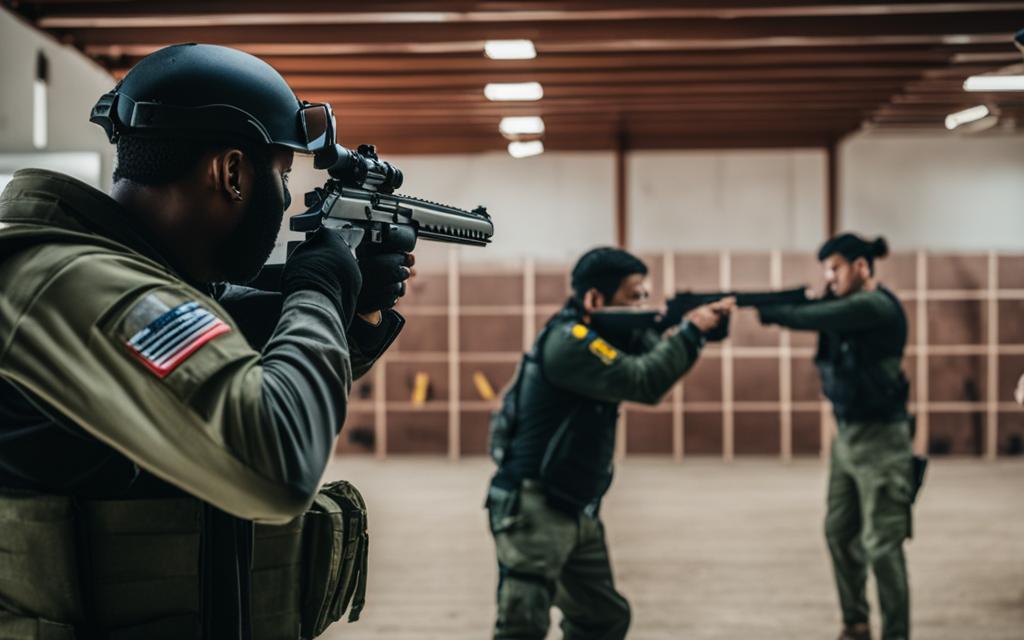Understanding How Security Guards Can Carry Weapons in the US - Secure Guard
- Home
- Security Services
- Understanding How Security Guards Can Carry Weapons in the US

- November 16, 2023
- By Ryan Bantique
Security guards have an important responsibility in ensuring the safety and security of individuals, properties, and assets. In some cases, this responsibility includes carrying firearms while on duty. This section will provide an overview of the regulations and training requirements for security guards in the United States to carry weapons. It will explore the role of armed security guards and the importance of their safety in carrying firearms while on duty.
Key Takeaways:
- Security guards can carry weapons while on duty.
- Armed security guards play an important role in protecting individuals and properties.
- Carrying firearms requires proper training and adherence to regulations.
- Only licensed security guards are allowed to carry weapons.
- The safety of both the guards and the public is of utmost importance.
Legal Requirements for Security Guards Carrying Weapons
Security guards in the United States who carry weapons must comply with legal requirements to ensure public safety and safeguard against unauthorized use of firearms.
The regulations for armed guards vary by state and jurisdiction. However, all security personnel must obtain a valid license and permit before carrying a firearm. The permit may require specific training and background checks, such as drug screening and fingerprinting.
In addition to obtaining the necessary permits, armed guards must also comply with federal and state laws that regulate the use of firearms. For instance, they must be trained on appropriate use of force and the legal limitations on the use of deadly force.
Firearms for Security Guards
Security guards carry various types of firearms, including handguns, rifles, and shotguns. The type of firearm carried depends on the job requirements and the level of threat faced by the guard.
Handguns are the most commonly used firearm by security guards. They are lightweight and easy to conceal, making them ideal for close-range protection. Rifles and shotguns are used for protection in areas where a security guard may need to engage a threat from a distance.
Weapons for Security Guards
Besides firearms, security guards may use other weapons for protection. These include pepper spray, batons, and tasers. The use of these weapons depends on the level of force required. Pepper spray is used for crowd control, while batons are used for close-range protection. Tasers are used to immobilize a suspect by temporarily disabling their muscles.
Guards with Guns
The presence of armed guards can be a deterrent against crime. The visible presence of a firearm can make potential offenders think twice before committing a crime. It is important to note that while armed guards can provide an additional level of security, they should only use their firearms when necessary.
Armed Security Personnel
Armed security personnel provide an essential service by protecting people and property. They undergo rigorous training and background checks to ensure their suitability for the position. Employers are required to ensure that their armed guards have the necessary permits and training to carry firearms.
Armed Security Services
Companies that offer armed security services must comply with federal and state laws and regulations. These companies must ensure that their personnel are licensed, trained, and equipped with the appropriate firearms and safety equipment.
Firearms training is an essential component of preparing security guards to carry weapons on duty. Ongoing proficiency in handling and utilizing firearms is crucial to maintain the safety of both guards and the public they serve.
Security guard firearms training is essential to ensure that security guards operate their weapons safely and legally. It also ensures that they can respond to emergencies effectively and efficiently. By having appropriately trained security guards, businesses can provide an extra layer of protection for their employees, customers, and assets.
Safety Measures for Armed Security Guards
Arming security guards with weapons comes with its fair share of risks. That’s why proper safety measures must be put in place to ensure the safety of both the armed security guards and the public.
Proper Weapon Handling
One of the primary safety measures for armed security guards is proper weapon handling. Security guard personnel must undergo rigorous training to ensure they are proficient in handling firearms. This includes rules for loading, unloading, and carrying the weapon, as well as a thorough understanding of the weapon’s capabilities.
Additionally, security guards must know how to handle their weapons in different situations, such as if they encounter an unarmed individual or if they need to escalate force.
Security Protocols
Another critical safety measure for armed security guards is the implementation of security protocols. This includes creating a secure area to store the weapon when not in use and ensuring that only authorized personnel have access to the weapon.
Security protocols also include creating a plan for emergency situations, such as an active shooter, to ensure that security guards know how to respond quickly and efficiently.
Personal Protective Equipment
Armed security guards must also be provided with the necessary personal protective equipment (PPE) to keep them safe while carrying weapons. This includes bulletproof vests, helmets, and eye and ear protection.
Providing PPE can help reduce the risk of injury to the armed security guard while also ensuring that they can operate at their best during high-pressure situations.
Ongoing Training
Finally, ongoing training is necessary to ensure the continued safety of armed security guards. Training should cover additional weapon handling techniques, updates on new security protocols, and emergency response scenarios.
With proper safety measures in place, armed security guards can operate safely and effectively, providing the necessary protection and security to their clients.
Role and Responsibilities of Armed Security Guards
Armed security guards play a pivotal role in ensuring the safety and security of businesses, organizations, and individuals. They are responsible for protecting property, enforcing regulations, and responding to emergencies. They work in a variety of settings, including banks, government buildings, hospitals, airports, and other public spaces where the potential for threats is high.
Many security guard services offer armed protection as part of their armed security solutions. One example is an armed guards company that specializes in providing armed protection services for clients who require an increased level of security. These armed guards undergo extensive training to ensure that they are equipped to handle any situation that may arise.
The duties of armed security guards may differ depending on the setting in which they work. However, their main responsibilities include:
- Deterring Crime: Armed security personnel can deter potential criminals from targeting a business, organization, or individual due to the added level of security and the possibility of a more severe response to any criminal activity.
- Enforcing Regulations: Armed guards are responsible for enforcing regulations set by the businesses or organizations they work for. This may include checking identification, verifying credentials, and ensuring compliance with the rules and regulations of the premises.
- Responding to Emergencies: Armed security guards are trained to respond to emergencies such as fires, medical emergencies, and criminal activity. They are equipped to handle any situation and ensure the safety of the people and property under their care.
- Working in Collaboration with Law Enforcement Agencies: Armed guards collaborate with local law enforcement agencies to ensure the safety of the premises and their occupants. In case of criminal activity, they work together to report incidents and provide assistance when necessary.
It is important to note that armed security guards are not law enforcement officers but are instead employed by businesses or organizations to provide protection and security services. They operate within the legal framework set by the state or jurisdiction in which they work and are subject to the same regulations and laws as any other citizen.
“A security guard’s fundamental duty is to provide safety and security to the premises, employees, and visitors. Armed security guards play an essential role in fulfilling this duty, ensuring the protection of people and property.”
Conclusion
Armed security guards play a critical role in maintaining safety and security in the United States. The ability for security guards to carry weapons is a privilege that comes with strict regulations and requirements. To ensure safety, proper training is crucial in understanding the use of force and legal guidelines when carrying firearms.
Carrying weapons is a serious responsibility that requires constant vigilance. Armed security guards are entrusted with protecting property and responding to emergencies. They work closely with law enforcement agencies to maintain law and order.
In conclusion, the regulations and training requirements for security guards to carry weapons in the U.S. are rigorous for good reason. It is a privilege reserved for those who are dedicated to upholding safety and security. Armed security guards are an essential part of the security industry and provide peace of mind to businesses and individuals across the country.
Stay Safe with Armed Guards
When in need of security guard services, consider choosing a company that employs armed protection services. Armed guards are trained to handle dangerous situations, providing an extra layer of safety and security. Contact an armed security solutions provider today to learn more.
FAQ
Can all security guards in the U.S. carry weapons?
No, not all security guards in the U.S. are allowed to carry weapons. Carrying weapons is subject to specific regulations and requirements.
What are the legal requirements for security guards to carry weapons?
Security guards must obtain the necessary licenses and permits, undergo background checks, and comply with any specific regulations imposed by their state or jurisdiction.
What kind of training do security guards receive to carry weapons?
Security guards undergo specific firearm training programs, including marksmanship, situational awareness, de-escalation techniques, and understanding the legal guidelines for the use of force.
What safety measures are in place for armed security guards?
Safety measures for armed security guards include proper weapon handling, adherence to security protocols, the use of personal protective equipment, and ongoing training to ensure their safety and the safety of the public.
What are the roles and responsibilities of armed security guards?
Armed security guards are responsible for protecting property, enforcing regulations, responding to emergencies, and working in collaboration with law enforcement agencies.




